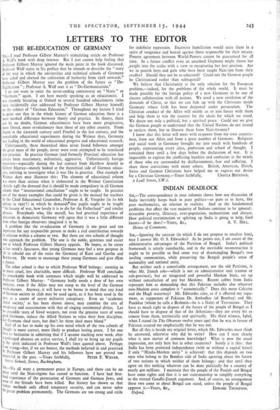LETTERS TO THE EDITOR
THE RE-EDUCATION OF GERMANY
read Professor Gilbert Murray's stimulating article on Professor A. Wolf's book with deep interest. But I just cannot help feeling that Professor Gilbert Murray ignored the main point in the book discussed. Professor Wolf states in Ins preface that he intends to describe the "story of the way in which the universities and technical schools of Germany have aided and abetted the cultivation of barbarity from 1918 onwards." Professor Gilbert Murray sees the problem of the future as " De- Nazification " ; Professor A. Wolf sees it as "De-GermanisatiOn."
I do not want to enter the never-ending controversy on " Nazis " or "Germans " again. I am here merely speaking as an educationist. I was recently lecturing at Oxford to several hundred educationists (who were incidentally also-addressed by Professor Gilbert Murray himself) on the subject of " German Education." Throughout my lecture I tried to point out that in the Whole history of German education there is a most marked difference between theory and practice. In theory, there can be no doubt, German educationists have been more progressive, more liberal, more revolutionary than those of any other country. From Sturm in the sixteenth century until Froebel in the last century, and the remarkable educational experiments during the Weimar days, Germany was leading in the world of educational progress and educational research.
Unfortunately, these theoretical ideas never found followers amongst the great mass of the people, never were even attempted to be translated into practice. In practice German (and formerly Prussian) education has always been reactionary, militaristic, aggressive. Unfortunately foreign observers—especially during the last century from Matthew Arnold to Gilbert Murray—merely looked at the theoretical side of German educa- tion, omitting to investigate what it was like in .practice. One example of Weimar days may illustrate this: The element of educational reform was more than serious when it elaborated in the Weimar Constitution (Article 148) the demand that it should be made compulsory in all German schools that " international conciliation " ought to be taught. In practice one of the many examples that could be given is the manual for teachers by the Chief Educational Counsellor, Professor A. K. Voegeler (in its 6th edition in 1927!) in which he demands*that pupils ought to be taught "the beauty of war, how lovely it is to die for the Fatherland" and similar phrases. Everybody who, like myself, has had practical experience of education in democratic Germany will agree that it was a little different from what foreign observers imagined it to be.
A problem like the re-education of Germany is too great and too important for any responsible person to make a real contribution towards its solution within a column or two. But there are two schools of thought who approach the problem. The one is the noble, generous and easier one to which Professor Gilbert Murray appeals. He hopes, as he states in last week's Spectator, that young Germans may feel a new purpose in life to rebuild out of the ruins the Germany of Kant and Goethe and Beethoven. He wants to encourage these young Germans and give them a chance.
The other school is that to which Professor Wolf belongs: seeming to be more cruel, less charitable, more difficult. Professor Wolf concludes his remarkable book with sentences which might well be addressed to Professor Gilbert Murray: " Germany badly needs a dose of her own medicine, even if the Allies may not stoop to the level of the German Witch-doctors. Anyway, it will have to be borne in mind that any kind of German society or club may be used again, as it has been used in the Past, as a centre of secret militarist conspiracy. Even an 'academic choral society,' as has been shown above, may combine the arts of conspiracy and assassination with that of singing sentimental ditties. Let no crocodile tears of hired weepers, not even the genuine tears of some good Germans, induce the Allied Nations to relax their firm discipline. Let Germans shed tears, but don't let them shed more blood."
Each of us has to make up his own mind which of the two schools of thought is more correct, more likely to produce lasting peace. I for one have no hesitation in admitting that if I resume teaching next week, after a prolonged absence on active service, I shall try to bring up my pupils ill the spirit indicated in Professor Wolf's lines quoted above. Perhaps I am wrong--but, if we are honest, the methods believed in and practised by Professor Gilbert Murray and his followers have not proved too auccessful in the past. —Yours faithfully, PETER F. WIENER. Stowe School, Stowe, Buckingham.






















 Previous page
Previous page